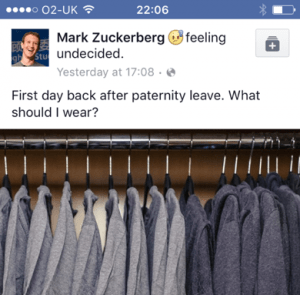Why Authentic Leaders are Winning
We’re more alert to authenticity than ever. When Mark Zuckerberg returned to Facebook after paternity leave, he posted this:

Without working at Facebook, the post resonates with our mental image of him and his leadership style. It’s authentic, humorous, and engaging; and Zuckerberg is one of the highest-rated CEO’s on US Glassdoor.
Authentic means true, genuine; something shown exactly as it is. As workers, consumers, and even parents, we are more savvy than ever; distrustful of claims which don’t ring true, or people we feel aren’t dealing with us straightforwardly. A proliferation of media and social media means that misrepresentation or dishonesty is quickly exposed, and we can crowd-source opinion from our peers in our search for our version of the truth. We prize authenticity, and this is shown in our choice of where to work, the media we consume, the products we buy, and everything in between.
So how does this trend to authenticity impact on leadership and the workplace? Let’s look firstly at how authentic leaders operate, and how this gives them an advantage:
- Authentic leaders have great self-awareness. While knowing and capitalising on their strengths, they can admit to not being 100% perfect. This vulnerability enables them to connect with employees more easily. When leaders are able to connect authentically with those they seek to lead, they become more approachable, trusted and influential. It also engenders a culture where people feel safe to be open about making mistakes, and the organisation can reap the rewards in terms of higher innovation, creativity and engagement.
- Authentic leaders are original. In half a decade of extensive research, no-one has produced one clear profile of the definitive leader. If everyone was trying to copy the “ideal” leadership formula, authentic leaders wouldn’t be desirable. This type of leader presents themselves to others as they really are, giving employees something genuine, not studied. When leaders are themselves, it also frees employees to express their individuality, which not only enhances two of the three core facets of engagement – affective and social – but increases loyalty too.
- Authentic leaders embrace new challenges and are always learning. They have a growth mindset, and foster this in the people around them. This engenders a valuable culture of learning, which is motivating and engaging for staff. Instead of merely stretching people through workload, staff are stretched in a positive sense, by variety and challenge.
- Authentic leaders connect better. The ability to connect enables leaders to communicate directly with empathy, making their message more likely to resonate. Communication of purpose and vision is essential to engaging your staff, but it’s the manner of the communication which leads to the highest levels of engagement.
- Authentic leaders are ethical and trustworthy, not making their mistakes where their ethics should have guided them otherwise. The values, purpose and goals of the organisation trump an authentic leader’s ego and desire for money or power, and these things, along with the leader’s innate character, lead them to act in a true and honest way.
There are other workplace trends which also lead to authentic leaders pulling the punches in terms of the engagement and retention of their workforce, and the productivity and performance of their organisations.
A Changing Workforce
The composition of the workforce is changing. Today’s workplace is now made up of around 40% Millennials, aged between 20-36 years. This group are now stepping into more senior roles and many have different needs to older employees. Growth and development is one of the characteristics of authentic leaders and it is also one of the greatest drivers of millennial engagement. As the best educated generation to date, millennials are highly attuned to envisioning their futures and seeking purposeful work. Authentic leaders are able to connect to these ambitions in a way which resonates and engages. Office politics will be counter-productive. The authentic leader is likely to win hearts and minds with this growing workforce demographic.
Trust in Leaders & Institutions
There is a wider trend of mistrust in institutions, and with their leaders. The string of recent corporate scandals is pushing corporate culture and ethical leadership to the top of Board agendas. A Culture Coalition project, set up by key bodies including the CIPD, Financial Reporting Council, Institute of Business Ethics, and CIMA, stressed the need for companies and their leaders to support and embed the correct values, attitudes and behaviours. Authentic leaders act with honesty, and their decision-making is based on sound ethics.
Levels of Engagement
87% of organisations rate Engagement and Retention as urgent and important, making this the most pressing of all issues according to Deloitte’s 2015 Global Human Capital Trends Report. One of the 5 five facets of the “Simply Irresistible Organisation” is trust in leadership (alongside meaningful work, hands-on management, an incredible work environment and opportunity for growth). Authenticity in leaders is a powerful enabler of higher employee engagement, as well as the engagement of other stakeholder groups: investors, partners, customers, and the wider community.
Today’s most authentic leaders and their business performance
It’s difficult to set a measure on authenticity, but Glassdoor’s approval rating and its top-rated CEOs list is a good starting point [1]. Craig Donaldson, CEO of Metro Bank earned a 98% employee approval rating on the UK list this year. Workers have praised Donaldson saying that he doesn’t back down from a challenge, he is willing to get his ‘’hands dirty and [he] cares about colleagues just as much as [he] cares about customers.”
Majestic wines CEO Rowan Gormley is described as “inspiring” and a “brilliant marketer” even by his detractors. While he has a gift for storytelling, the communication is two-way. He recently set up a Google+ page so Majestic’s staff can pitch in with ideas, with the best ones coming from his in-store staff. He has a 93% approval rating from employees.
The results speak for themselves. Only 7 years ago, Craig Donaldson bought a laptop on Tottenham Court Road and set to work with a couple of partners on a set of business plans, and a concept based on service rather than price. Metro Bank is now a FTSE 250 company, employing over 2,000 staff, with 40 branches and over 700,000 accounts.
The creation of great workplaces is a lot to do with the leaders at their helm. Best Workplaces have been shown to financially outperform their competitors by 2-3% per year [2]. Authentic leadership is an enabler of business performance through creating higher engagement and outstanding cultures, and practicing sound strategic thinking and ethical decision-making.
Starboard partners with individual leaders and executive teams in the UK and globally, and our rapidly expanding team offers deep insight in the fields of employee engagement, organisational culture and leadership development. Talk to us now to learn more about our work with clients, and our approach.
[1] Glassdoor UK, Highest Rated CEO’s 2019
[2] 4-year academic study of Fortune Best Companies by Professor Alex Edmans at London Business School.

